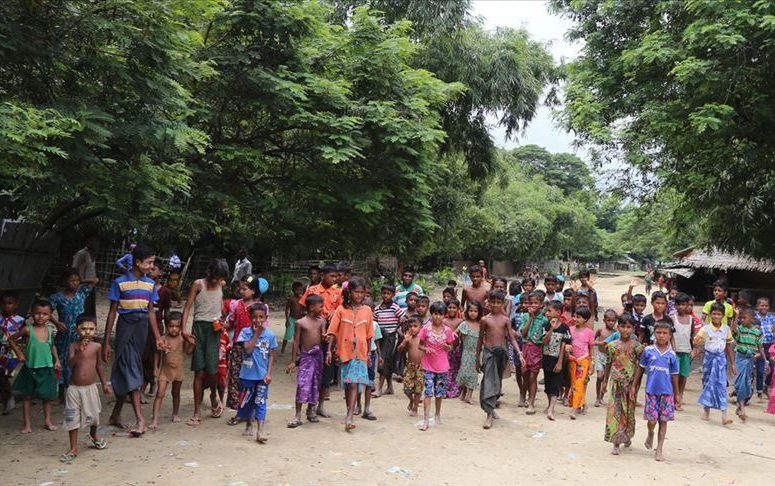Experts plead for the restoration of internet services in camps to allow Rohingya to access information within their shelters
Bangladesh has begun lockdown in all 34 Rohingya refugee settlements in the country’s southern district of Cox’s Bazar as part of its effort to stem coronavirus pandemic.
Authorities have asked more than one million members of the persecuted Rohingya community, who have migrated from Myanmar’s Rakhine province, to stay inside their makeshift camps until further notice.
“Since this morning [Wednesday] we have started s lockdown in all Rohingya camps as per guidelines issued by the government due to the prevailing scare over coronavirus outbreak,” said Md Mahbub Alam Talukder, Bangladesh’s Refugee Relief and Repatriation Commissioner (RRRC).
Citing the global spread of coronavirus Talukder told Anadolu Agency: “It will be a very difficult job for us to control the situation if coronavirus spreads in the crowded Rohingya camps.”
He said it was because of this fear that we are asking Rohingya to stay home. “We are fully aware and urge them [Rohingya] to stay home and not move except for emergency needs,” he said.
According to John Hopkins Coronavirus Resource Centre, Bangladesh has so far reported 39 cases of coronavirus with five deaths. Thousands of others have been kept under home quarantine to stem the spread of the lethal virus.
Assuring continuation of emergency services despite lockdown Talukdar said that his office has pleaded for the restoration of internet services in the Rohingya camps.
“Already a letter from Foreign Ministry has been sent to Home Ministry, seeking resumption of internet services in the Rohingya camps,” he said, adding that the services will be restored in the shortest possible time.
Meanwhile, some Rohingya refugees living in the crowded camps confirmed to Anadolu Agency on Wednesday that they were able to use internet services, but with slow speed.
“We are happy that till now we are protected from coronavirus. We can use mobile and internet now though data speed is slow,” Mohib Ullah, a Rohingya community leader, told Anadolu Agency.
The RRRC office in a circular issued on Wednesday sought continuation of emergency services including health, nutrition, information hubs, hygiene promotion and health awareness, individual protection services, reception of new arrivals, maintenance of water and sanitation facilities, as well as key distributions such as food, LPG and hygiene kits.
Restore internet
Meanwhile, Rohingya rights activists and experts have urged the Bangladesh government to fully restore the internet in the Rohingya camps so that the displaced people can get the necessary information staying inside their tents.
“The camps inside Bangladesh and Myanmar have all the conditions to allow transmission of COVID-19 to Rohingya people. World Health Organization and medical experts are recommending social distancing which is almost impossible in the camps,” said Dr. Anita Schug, co-founder of Rohingya Medics Organization.
She told Anadolu Agency that social distancing is possible if internet services are fully restored which will allow Rohingya people to stay inside and get access to the information within their shelters. She said the lifting of the internet shut down may help Rohingya to abide by preventive measures.
“Food and medicines must continue to reach the vulnerable population and government and NGOs must discuss how they can deliver this without Rohingya having to stand in long queues,” Schug added.
Speaking to Anadolu Agency an official of the UN refugee said they were taking steps to prevent the risk of the spread of COVID-19 within the camp.
“The humanitarian community [in the camps] is strictly following Government advisories as they are issued. These are evolving and may change in the coming days.” said Louise Donovan, communications officer at the UN Refugee Agency.
“The humanitarian community is taking all preventive and precautionary measures to mitigate the risks of COVID-19 for the people we serve, as well as our own teams, while also ensuring that essential activities and facilities, to the extent possible, must continue, including but not limited to health, nutrition, essential protection services and maintenance of water and sanitation facilities, as well as key distributions such as food, LPG and WASH/hygiene kits,” Donovan added.
With a population of 170 million, Bangladesh is imposing countrywide lockdown, suspending water, rail and air travel and also banned public road transport form Thursday.
All educational institutions have been closed. The government offices, commercial establishments except for medical and grocery stores will remain shut for 10 days. The army has been deployed countrywide to ensure social distancing.


